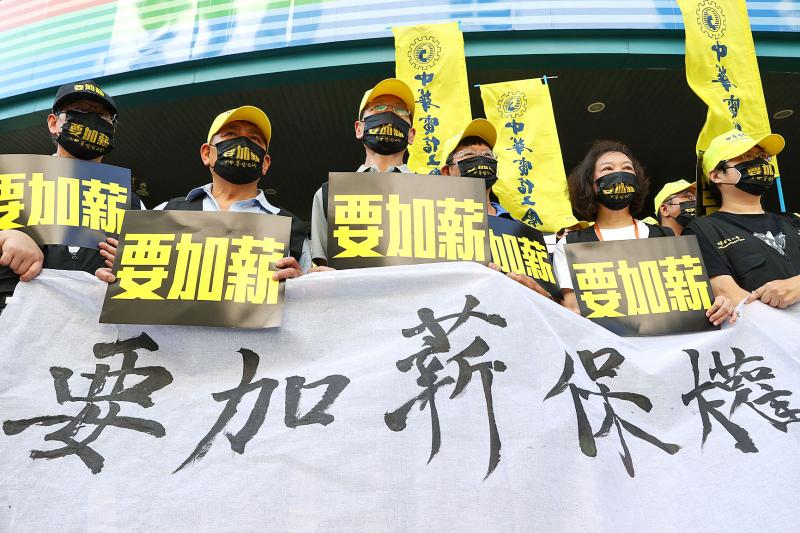Chunghwa Telecom Co (中華電信) workers yesterday protested over chronic labor disputes, called for increased pay and expressed opposition to a restructuring plan.
Workers yesterday protested in front of Chunghwa Telecom’s headquarters in Taipei’s Zhongzheng District (中正), saying that among the key issues was the company’s inaction on a call for a pay increase of NT$5,000 per month, or about 8 percent, amid rising inflation.
The union’s salary raise proposal was not even on the agenda of the company’s extraordinary board meeting yesterday, protest leaders said.

Photo: CNA
Workers said that they are being unfairly treated with stagnant salaries, despite the telecom posting a strong profit last year.
“The company failed to positively respond to the union’s requests during the negotiations, which aimed to settle differences over labor interests and working conditions,” Chunghwa Telecom Workers’ Union chairman Horng Show-long (洪秀龍) told reporters on the sidelines of the protest.
“Our salaries are lower than our expectations and we now are forced to stand up to safeguard our interests and labor rights,” Horng said.
Chunghwa Telecom has a workforce of about 22,000 people, with their monthly salary averaging about NT$60,000.
All of its employees are part of the union.
The union also demanded that any restructuring and transformation plan the company has be fully discussed before it is implemented.
Chunghwa Telecom said it is willing to communicate with the union over pay raises and labor disputes.
It also plans to overhaul its organization and aims to resolve its differences with employees, the company said in a statement.
The union said that it has not set a timetable for a strike, as it hopes the disputes can be solved through negotiation.

The US dollar was trading at NT$29.7 at 10am today on the Taipei Foreign Exchange, as the New Taiwan dollar gained NT$1.364 from the previous close last week. The NT dollar continued to rise today, after surging 3.07 percent on Friday. After opening at NT$30.91, the NT dollar gained more than NT$1 in just 15 minutes, briefly passing the NT$30 mark. Before the US Department of the Treasury's semi-annual currency report came out, expectations that the NT dollar would keep rising were already building. The NT dollar on Friday closed at NT$31.064, up by NT$0.953 — a 3.07 percent single-day gain. Today,

‘SHORT TERM’: The local currency would likely remain strong in the near term, driven by anticipated US trade pressure, capital inflows and expectations of a US Fed rate cut The US dollar is expected to fall below NT$30 in the near term, as traders anticipate increased pressure from Washington for Taiwan to allow the New Taiwan dollar to appreciate, Cathay United Bank (國泰世華銀行) chief economist Lin Chi-chao (林啟超) said. Following a sharp drop in the greenback against the NT dollar on Friday, Lin told the Central News Agency that the local currency is likely to remain strong in the short term, driven in part by market psychology surrounding anticipated US policy pressure. On Friday, the US dollar fell NT$0.953, or 3.07 percent, closing at NT$31.064 — its lowest level since Jan.

The New Taiwan dollar and Taiwanese stocks surged on signs that trade tensions between the world’s top two economies might start easing and as US tech earnings boosted the outlook of the nation’s semiconductor exports. The NT dollar strengthened as much as 3.8 percent versus the US dollar to 30.815, the biggest intraday gain since January 2011, closing at NT$31.064. The benchmark TAIEX jumped 2.73 percent to outperform the region’s equity gauges. Outlook for global trade improved after China said it is assessing possible trade talks with the US, providing a boost for the nation’s currency and shares. As the NT dollar

The Financial Supervisory Commission (FSC) yesterday met with some of the nation’s largest insurance companies as a skyrocketing New Taiwan dollar piles pressure on their hundreds of billions of dollars in US bond investments. The commission has asked some life insurance firms, among the biggest Asian holders of US debt, to discuss how the rapidly strengthening NT dollar has impacted their operations, people familiar with the matter said. The meeting took place as the NT dollar jumped as much as 5 percent yesterday, its biggest intraday gain in more than three decades. The local currency surged as exporters rushed to